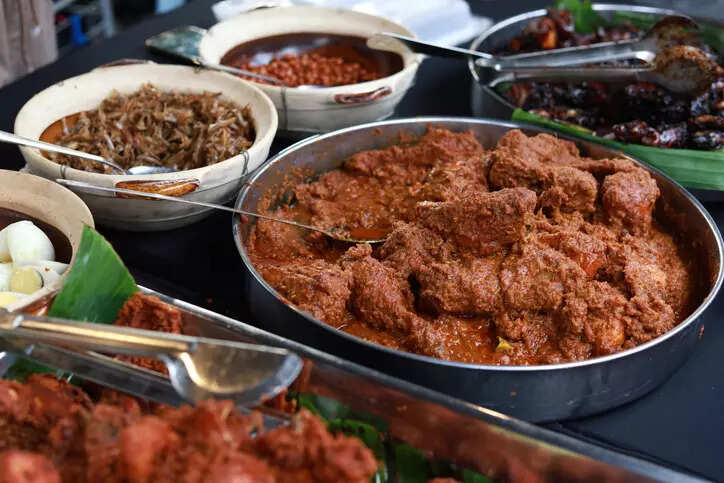ARTICLE AD BOX

There are dishes that satisfy hunger, and then there are dishes that outlast empires. Rendang belongs firmly to the second category. Born in the misty highlands of West Sumatra, it is not just food.
It is memory, migration, and patience in a single pot.
The Origin Story
Among the Minangkabau people of Indonesia, cooking was never a hurried act. Every stir and every grind of spice carried intention. They called the process merendang, which means to slow-cook until the liquid disappears, the oil rises, and what remains is soft, fragrant perfection. Rendang was not designed for indulgence but for endurance.Centuries ago, Sumatran traders packed it as travel food. Coconut milk and spice worked as natural preservatives.
Clove, cinnamon, lemongrass, and chili added both taste and time. Rendang could last for weeks in tropical heat without spoiling. It was a form of edible resilience.
In Minangkabau kitchens, rendang is a communal affair. Families gather to cook during weddings, Eid, or harvest festivals. The act of stirring the pot together represents kinship and respect. Every ingredient carries meaning: chicken or mushroom for nourishment, coconut for wisdom, chili for courage.
To make rendang is to pass on culture through the language of spice.
The Spice Route Connection
Before colonial maps divided the islands, the Malay world was already a global trading hub. From Indian traders came cardamom and cloves, from the Portuguese came chili, and from the Minangkabau came innovation. By the 18th century, European visitors wrote of a “black caramelised curry that survived days under the sun.” It was both culinary genius and quiet defiance.
The Journey
Rendang travelled wherever its people went. In Malaysia, it became sweeter. In Java, gentler. In the Netherlands, it found its way into rijsttafel banquets, a symbol of how colonialism borrowed from what it once tried to control. Yet, wherever it went, the soul of rendang remained intact.
Rendang Today

Rendang has been crowned one of the world’s most delicious foods and now appears in everything from fine dining to street food. Yet its essence is unchanged.
It is still cooked slowly, with attention and respect. It reminds us that flavour takes time, and that tradition, like spice, cannot be rushed.
How to Make Rendang Curry
Prep time: 25 minutesCook time: 1.5–2 hoursServes: 4
Chicken Rendang

Ingredients:
1 kg chicken (cut into medium pieces)400 ml thick coconut milk2 stalks lemongrass, bruised5 kaffir lime leaves1 cinnamon stick1 tsp tamarind pasteSalt and palm sugar to taste
Spice paste:
8 shallots4 cloves garlic4 red chillies3 cm galangal2 cm ginger1 tsp turmeric powder
Method:
Blend the spice paste ingredients until smooth.Heat a little oil in a large pot and fry the paste until fragrant.Add lemongrass, cinnamon, and lime leaves, then stir in the chicken until coated.Pour in the coconut milk and tamarind paste, bring to a simmer, and lower the heat.Cook uncovered for 1.5 to 2 hours on low flame, stirring occasionally, until the sauce thickens and the oil separates.Season with salt and palm sugar. Serve with steamed rice or lemang.
Mushroom Rendang (Vegan Version)

Ingredients:
500 g button or oyster mushrooms, halved1 cup young jackfruit or tofu (optional, for texture)400 ml coconut milk2 stalks lemongrass, bruised5 kaffir lime leaves1 tsp tamarind pasteSalt and palm sugar to taste
Spice paste:
6 shallots3 cloves garlic4 red chilies2 cm galangal2 cm ginger1 tsp ground coriander1 tsp turmeric powder
Method:
Blend the spice paste until smooth.In a wok, heat oil and sauté the paste until the aroma deepens.Add lemongrass and lime leaves, followed by mushrooms (and jackfruit or tofu if using). Stir well.Add coconut milk and tamarind, then simmer gently on low heat for about 45 minutes, until the sauce thickens and clings to the mushrooms.Finish with palm sugar and salt. Let it rest before serving.Rendang rewards patience. The slower it cooks, the deeper it tastes. Whether with chicken or mushrooms, what matters most is time, because that is the one ingredient that cannot be replaced.

 7 hours ago
7
7 hours ago
7








 English (US) ·
English (US) ·